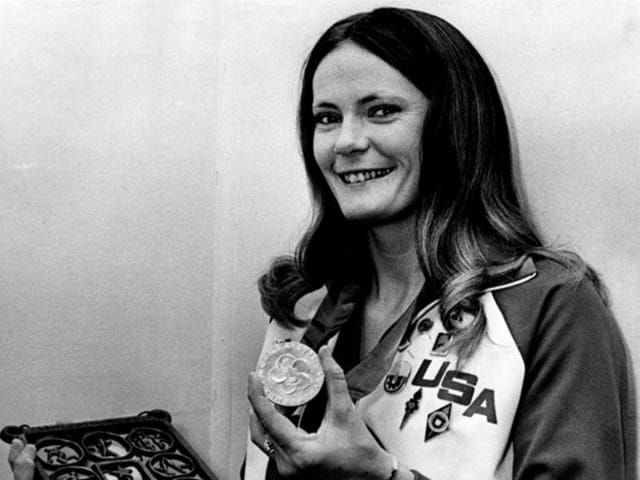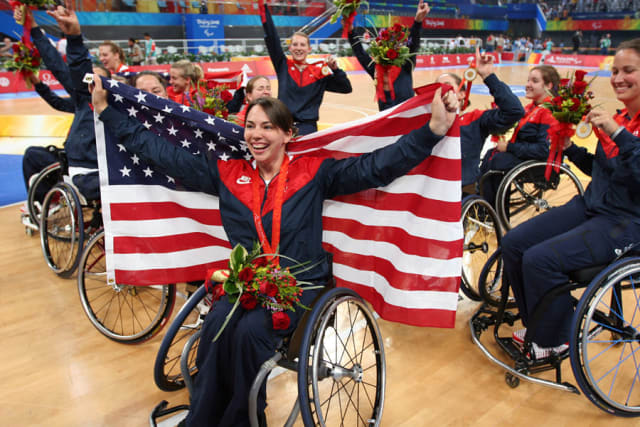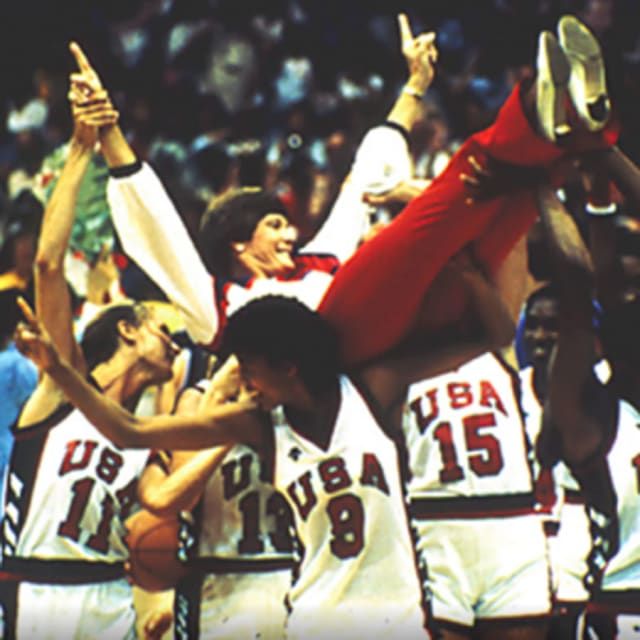Watching Pat - Stephanie Wheeler on lessons from the Summitt
CHARLOTTE (Steve Goldberg's Wheel World) - The spirit of FIBA Hall of Fame coach Pat Summitt, who passed last week, will be present in Rio through her influence on USA Paralympic coach Stephanie Wheeler.
CHARLOTTE (Steve Goldberg's Wheel World) - When I first heard of the passing of FIBA Hall of Fame coach Pat Summitt last week, my thoughts turned to her impact on the game, and influence on the players privileged to suit up for her Tennessee or USA national teams, and the myriad coaches on both her bench and the opponent's.
Another coach she influenced will lead the USA Women's Wheelchair Basketball Team against the world in Rio this September. That would be Stephanie Wheeler, head coach at the University of Illinois, not to mention a two-time Paralympic gold medalist and four-time NWBA national collegiate champion as a player. These are her words.
Here is a what Wheeler had say about Summitt.
"As a 17-year-old, I remember watching my beloved UNC Tarheels play in the regional finals against the Tennessee Lady Vols, but it was the coach for the other team, not the athletes, that stole my attention. She was strong, confident, worked the power suit, and had this steely blue-eyed glare that could make you shiver from across the court. For the rest of the game, I remember watching her every move. I don't remember much other than the result of that game (my Tarheels lost), but I will forever remember that coach: Pat Summitt.

Before she became a FIBA Hall of Fame coach, Pat Head (Summitt) won gold playing for the USA in the 1973 World University Games. Photo courtesy of the University of Tennessee.
From that moment on, I watched every game she coached that was on TV, every post-game interview I could, and devoured any article or story I could read about her. I've read her books Raise the Roof and Reach For The Summitt more times than I can count! I shed tears as I read Sum It Up. As a small town girl with a disability, who always felt like she lived on the fringe, confidence and a sense of belonging didn't come easy.
I was also a tomboy, so when my friends were getting into fashion, wearing makeup, and going out with boys, I was more concerned with working on my ball handling and how many shots I got up on my backyard hoop that night. I always felt different, not worthy of confidence and strength; but in my backyard with my hoop or on the court, that’s where I was home. The more I watched Pat Summitt and Summitt-coached teams, the more I began to challenge the assumptions I held about myself, and I realized that I wanted to be coached by someone like her, to be like her athletes, and most importantly, to be like her.
I was fortunate enough to be recruited to the University of Illinois and play for Mike Frogley, who embodied a lot of the same characteristics that Pat did: competitive, confident, strong, had high expectations of his athletes.
I began to evolve from a shy kid who felt like she didn’t belong, to a confident, young woman who knew that she wanted to be a coach someday, and Pat Summitt was my hero. - Wheeler
As time passed and I moved on to the University of Alabama for my graduate work, I was doing everything in my power to put myself in a position to be a great coach someday, both on the court and educationally.

As a player, Stephanie Wheeler achieved two Paralympic gold medals at Athens 2004 and Beijing 2008. Rio 2016 will be her first games as head coach. Photo by Steve Goldberg/SCS Media
I also knew that since Alabama was in the SEC, the Tennessee Lady Vols would someday come to play in Tuscaloosa. That day finally arrived and I showed up to the game 40 minutes early, eager to watch my role model and hero finally coach in person. I was enthralled with watching her work the sidelines, coach in the huddle, and demand excellence from each one of her student-athletes. It was an opportunity of a lifetime to watch Pat coach and I just knew that I couldn't let this moment pass without trying to meet someone who was already profoundly influencing my future coaching career.
With my well-loved copy of Raise the Roof in hand, I made my way down to center court where she was being interviewed for her post game radio show. I didn't know if she would see me or if she would have time to speak.
But she did, and it was a moment that I will never forget. I introduced myself; she asked about the Team USA jacket that I was wearing - this was in 2005, the year after the Athens Paralympics - and I had the opportunity to tell her that she was my role model and that, someday, I wanted to be a coach. She graciously signed my book, wished me the best in my playing and future coaching career, and was then whisked off to the locker room.

The winningest coach in Division I college basketball history, Pat Summitt died Tuesday morning, June 28, 2016. She was 64. Graphic courtesy of the University of Tennessee
During this past week, since the moment I read that Pat had passed away, that moment has run through my head hundreds of times.
As I write this, I'm overwhelmed with moments, and tears of gratitude, and profound sadness at our loss. I've read article after article written by former players, sports writers, and friends, and they all echo the same reasons that she was so important to me.
We didn't know one another but for that brief courtside moment, yet she has had an immense impact and influence on the way that I coach, the values that I bring to our program at the University of Illinois, and the national team, and how I want to impact the sport while I have the privilege to call myself a coach.
She was never in coaching for herself, and was always out to do whatever it took to grow the game. She knew that the game of basketball would be around longer than she was, so she did all she could to make it better, which is how I approach the work that we do with the NCAA; what can we do to grow this game so that hundreds and hundreds of girls and women after us can play this wonderful sport at the highest level.
Most importantly for me, she redefined society's expectation of what young, athletic women were capable of, showing them that their excellence on the court extended into every part of their lives, and that we should be empowered to follow our dreams.

As head coach of the 1984 USA Olympic Team, Pat Summitt led her team to their first gold medal. Photo courtesy of the University of Tennessee
From watching Pat, I learned that I was doing a disservice to treat myself as if I'm mediocre and to never settle for anything less than giving my best.
From watching Pat, I learned that it's not the wins and losses that ultimately matter (though she also showed me that being a woman and a fierce competitor was ok and necessary); it's the integrity with which you coach and impact that you have on the lives and character of the young women that you are coaching and teaching each day.
From watching Pat, I learned that you could be compassionate, but demanding at the same time; you just had to show your athletes that you cared about them as people first. The piercing stare wouldn't have worked if the athletes didn’t know that she cared about them. I work very hard to show my athletes that I care, so that when my version of the blue-eyed stare comes, they know that it comes from a place of love.
And from watching Pat, I learned that in order to grow the game, you have to bring the future with you, so we as coaches must be generous with our time, advice, and knowledge in order to bring the next generation of female coaches with us.
So thank you Pat Summitt for being my hero. Thank you for showing boys and girls that it's ok to have conviction, integrity and passion. Thank you for changing the world of sports, so that I have the opportunity to coach a team of disabled women athletes at the collegiate and international level. And thank you for helping this small town disabled tomboy see that I am worthy of living a life of excellence. You know, my favorite Pat Summitt quote is "The world isn't a place you live; it's a place you change."
"The world isn’t a place you live; it’s a place you change." - Summitt
She changed my world and I will work every day to live a life of influence so that I may have the opportunity to change someone else's.
Stephanie Wheeler, Coach; as told to
Steve Goldberg
FIBA
FIBA's columnists write on a wide range of topics relating to basketball that are of interest to them. The opinions they express are their own and in no way reflect those of FIBA.
FIBA takes no responsibility and gives no guarantees, warranties or representations, implied or otherwise, for the content or accuracy of the content and opinion expressed in the above article.
To help make this column as inclusive as possible, please send any national or international event information, story suggestions, or comments to wheelworldmail@gmail.com.